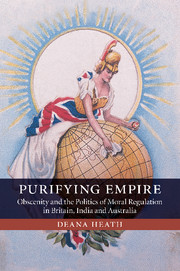Book contents
- Frontmatter
- Contents
- List of abbreviations
- Introduction: Books, boundaries and Britishness
- 1 Colonialism and governmentality
- 2 From sovereignty to governmentality: the emergence of obscenity regulation as a biopolitical project in Britain
- 3 Globalizing the local: imperial hygiene and the regulation of the obscene
- 4 Localizing the global in settler societies: regulating the obscene in Australia
- 5 Localizing the global in exploitation colonies: regulating the obscene in India
- Conclusion: Retangling empire, nation, colony and globe
- Bibliography
- Index
2 - From sovereignty to governmentality: the emergence of obscenity regulation as a biopolitical project in Britain
Published online by Cambridge University Press: 06 July 2010
- Frontmatter
- Contents
- List of abbreviations
- Introduction: Books, boundaries and Britishness
- 1 Colonialism and governmentality
- 2 From sovereignty to governmentality: the emergence of obscenity regulation as a biopolitical project in Britain
- 3 Globalizing the local: imperial hygiene and the regulation of the obscene
- 4 Localizing the global in settler societies: regulating the obscene in Australia
- 5 Localizing the global in exploitation colonies: regulating the obscene in India
- Conclusion: Retangling empire, nation, colony and globe
- Bibliography
- Index
Summary
Between the late eighteenth and early nineteenth centuries a new biopolitical genealogy for regulating the obscene emerged in Britain. Its origins were three-fold. The first was interacting social, economic and political apprehensions among the propertied classes wrought by the effects of both the Industrial and French Revolutions, in particular fears about the socio-moral conditions of the working classes, which ‘created “the social” as a focus for debate’. The second, tied to the discovery of the social, was the emergence of a new governmental rationality that relied on regulatory strategies to transform the behaviour of working-class bodies. The third was the manifestation, between the 1820s and 1840s, of a new set of ‘relations of ruling’ wrought by the emergence of a complex civil society, including new print cultures, which while undermining the prevailing tripartite state–church–property nexus served to enhance the power of the state through providing an infrastructure which enabled the expansion of administrative systems. It also, however, forced the state to take account of the web of new civil associations that linked the propertied classes with the growing middle and artisan classes. Prominent among these were moral reform organizations that sought to act upon others through undertaking regulatory projects – including the regulation of the obscene – designed to improve the morals of the populace, most notably those of the working classes, through the inculcation of self-governance.
- Type
- Chapter
- Information
- Purifying EmpireObscenity and the Politics of Moral Regulation in Britain, India and Australia, pp. 35 - 64Publisher: Cambridge University PressPrint publication year: 2010



